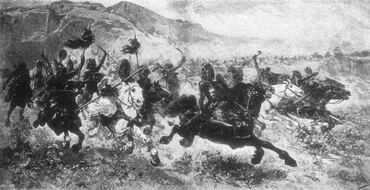1
Jak hustým oblakem prchlivosti své přikryl Pán dceru Sionskou! Shodil s nebe na zem slávu Izraelovu, aniž se rozpomenul na podnože noh svých v den prchlivosti své.
2
Sehltil Pán beze vší lítosti všecky příbytky Jákobovy, zbořil v prchlivosti své ohrady dcery Judské, udeřil jimi o zem, v potupu uvedl království i knížata její.
3
Odťal v rozpálení hněvu všecken roh Izraelův, odvrátil zpět pravici svou od nepřítele, a rozpáliv se proti Jákobovi jako oheň plápolající, pálí do cela vůkol.
4
Natáhl lučiště své jako nepřítel, postavil pravici svou jako protivník, i zbil všecky nejzdařilejší z lidu, a vylil do stánku dcery Sionské jako oheň prchlivost svou.
5
Učiněn jest Pán podobný nepříteli, sehltil Izraele, sehltil všecky paláce jeho, zkazil ohrady jeho, a rozmnožil v lidu Judském zámutek a žalost.
6
Mocí zajisté odtrhl jako od zahrady plot svůj, zkazil stánek svůj, v zapomenutí uvedl Hospodin na Sionu slavnost a sobotu, a v prchlivosti hněvu svého zavrhl krále i kněze.
7
Zavrhl Pán oltář svůj, v ošklivost vzal svatyni svou, vydal v ruku nepřítele zdi a paláce Sionské; křičeli v domě Hospodinově jako v den slavnosti.
8
Uložiltě Hospodin zkaziti zed dcery Sionské, roztáhl šňůru, a neodvrátil ruky své od zhouby; pročež val i zed kvílí, a spolu mdlejí.
9
Poraženy jsou na zem brány její, zkazil a polámal závory její; král její i knížata její mezi pohany. Není ani zákona, proroci také její nemívají vidění od Hospodina.
10
Starší dcery Sionské usadivše se na zemi, mlčí, posýpají prachem hlavy své, a přepasují se žíněmi panny Jeruzalémské, svěšují k zemi hlavy své.
11
Zhynuly od slz oči mé, zkormoutily se vnitřnosti mé, a vykydla se na zem játra má, pro potření dcery lidu mého, když i nemluvňátka a prsí požívající na ulicích města se svírají.
12
A říkají matkám svým: Kdež jest obilé a víno? když se jako zraněný svírají po ulicích města, a vypouštějí duše své na klíně matek svých.
13
Kohoť za svědka přivedu? Koho připodobním k tobě, ó dcero Jeruzalémská? Koho tobě přirovnám, abych tě potěšil, panno dcero Sionská? Nebo veliké jest jako moře potření tvé. Kdož by tě zhojiti mohl?
14
Proroci tvoji předpovídali tobě lživé a ničemné věci, a neodkrývali nepravosti tvé, aby odvrátili zajetí tvé, ale předpovídali tobě těžkosti, oklamání a vyhnání.
15
Všickni, kteříž jdou cestou, tleskají nad tebou rukama, diví se a potřásají hlavou svou za tebou, dcero Jeruzalémská, říkajíce: To-li jest to město, o němž říkávali, že jest nejkrásnější a utěšením vší země?
16
Všickni nepřátelé tvoji rozdírají na tebe ústa svá, hvízdají a škřipí zuby, říkajíce: Sehlťme ji. Totoť jest jistě ten den, jehož jsme očekávali; jižtě nastal, vidíme.
17
Učinil Hospodin to, což byl uložil, splnil řeč svou, kterouž přikazoval ode dnů starodávních, bořil bez lítosti, a obveselil nad tebou nepřítele, povýšil rohu protivníků tvých.
18
Vykřikovalo srdce jejich proti Pánu. Ó ty zdi dcery Sionské, vylévej jako potok slzy dnem i nocí, nedávej sobě odpočinutí, aniž se spokojuj zřítelnice oka tvého.
19
Vstaň, křič v noci, při počátku bdění, vylévej jako vodu srdce své před oblíčejem Páně; pozdvihuj k němu rukou svých za život dítek svých svírajících se hladem, na rohu všech ulic, a rci:
20
Pohleď, Hospodine, a popatř, komu jsi tak kdy učinil? Zdaliž jídají ženy plod svůj, nemluvňátka rozkošná? Zdaliž mordován býti má v svatyni Páně kněz a prorok?
21
Leží na zemi po ulicích mladý i starý, panny mé i mládenci moji padli od meče, zmordoval jsi je, a zbil v den prchlivosti své bez lítosti.
22
Svolal jsi jako ke dni slavnosti z vůkolí ty, jichž se velice straším, a nebylo v den prchlivosti Hospodinovy, kdo by ušel neb pozůstal. Kteréž jsem na rukou pěstovala a vychovala, ty nepřítel můj do konce zhubil.







